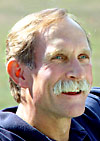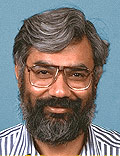
Events 2003
Nobel leureate in chemistry 2003, professor Peter Agre at Johns Hopkins University, Baltimore, USA, is visiting the University of Oslo on 15 December 2003. Agre will give a guest lecture on the subject:
|
| Friday
12 December - Saturday 13 December 2003, Norwegian-French
mini symposium on rare neurodegenerative diseases and neurogenetics,
at Ullevål University Hospital. Programme and more information. |
Wednesday 10 September 2003 at 14.00, guest lecture in the new auditorium 13, Domus Medica: Professor and Chair Stanley C. Froehner, Department of Physiology and Biophysics, University of Washington, will give a lecture with the title:
|
|
Shankar Subramaniam, University of California at San Diego & San Diego Supercomputing Center, will give a lecture with the title:
Shankar Subramaniam is Professor of Bioengineering, Chemistry, and Biochemistry at the University of California at San Diego, Senior Fellow at the San Diego Supercomputing Center, and Guest Professor at the Centre for Molecular Biology and Neuroscience, University of Oslo. Before he moved to UCSD, he was the Director of the computational biology group at the National Center for Supercomputing Applications. His present research focuses on several important aspects of computational biology. These include web-based approaches to bioinformatics, going from protein sequence to structure and function and studying protein recognition and function. Dr. Subramaniam is head of database developments under The Alliance for Cellular Signaling, a multi-institution, multidisciplinary project, utilizing a multitude of high throughput approaches to obtain context-specific knowledge of cellular response to input. In addition, Subramaniam will give the following three lectures, all in the lunch room at the Department of Anatomy:
|
Monday 2 June 2003, at 11:00, lecture in the lunchroom, Department of Anatomy: Dr. med. Axel Sandvig, will give a lecture with the title:
"Foredraget vil presentere resultater av Sema 3a og Neuropilin-1 mRNA in situ hybridiseringsstudier som viser dynamisk ekspresjon av Sema 3a etter perifer nerveskade mot n. ischiadicus samt etter unilateral lumbal dorsalrots rhizotomi og bilateral thoracal dorsal funiculus lesjon hos voksne rotter. Immuncytokjemiske resulater som viser tilsvarende proteinekspresjon vil også beskrives." |
Wednesday 14 May - Thursday 15 May 2003, CMBN research seminar (forskerkurs) in the main auditorium at Rikshospitalet.
Sign up before 15 April 2003 by email to elin.corneliussen@basalmed.uio.no. |
Thursday 3 April 2003, at 14:00, guest lecture in auditorium A3.3067 at Rikshospitalet: Professor Etienne Herzog, from Institut Mondor de Medecine Molecularire (IM3), France, will give a lecture with the title:
Welcome! |
Thursday 13 March 2003, at 12.00-13.30, guest lecture in (nye) auditorium 13 at Domus Medica: Professor Raymond Dingledine, Professor and Chairman at the Department of Pharmacology, Emory University School of Medicine, will give a lecture with the title:
Raymond Dingledine has been Professor and Chairman of the Department of Pharmacology at Emory University for the past decade. In the field of neuropharmacology, Dingledine's experience is second to none. He did his PhD with Avram Goldstein, a drug addiction specialist, at Stanford University in 1975, followed by a post-doc with Leslie Iversen at Cambridge. During his professorship at the University of North Carolina, he did a sabbatical in Steve Heinemann's lab at the Salk Institute. He has consulted for three major pharmaceutical companies and is currently on the scientific advisory boards of two small biotech firms. Among other things, he was Editor of Molecular Pharmacology and has served on a variety of National Institutes of Health and National Science Foundation review panels, and received far too many awards to mention. His research accomplishments include the discovery that glycine is a coagonist of NMDA receptors (Science 241, 835; 1988) and characterization of the topology of a glutamate receptor subunit (Neuron, 14, 373; 1995). He has more recently also been studying changes in gene expression with microarrays during epileptogenesis. To analyze this kind of data he has been developing systems for automated extraction of biomedical knowledge from gene and text databases ("text data mining"). He is a very didactic and enthusiastic teacher. Everyone is welcome! |
PO Box 1105 Blindern, NO-0317 Oslo, Norway. Tel: +47 22851528. Fax: +47 22851488


